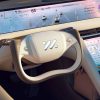 Microsoft CEO Satya Nadella announced the integration of AI-powered chatbots like ChatGPT into the company's Bing search engine earlier this year. Photo: Microsoft. /PA
Microsoft CEO Satya Nadella announced the integration of AI-powered chatbots like ChatGPT into the company's Bing search engine earlier this year. Photo: Microsoft. /PA
Walter Sun, the company's vice president of AI for business applications, believes that by 2028 Copilot may even become «autopilot». the manager can simply ask the software to do all the work.
“We start by delivering features that involve a human to make sure everything works,” Sun says. “Perhaps in five years these things will become more self-service. I think it's possible.”
Copilot was first tested commercially on GitHub, a Microsoft-owned collaboration site for software developers. Instead of people writing code and then posting it on GitHub for others to criticize (and borrow), Microsoft used the GPT program to create a virtual assistant capable of writing code itself in response to user requests.
< p>AI assistants in Microsoft products will become ubiquitous, writing code, emails, and Powerpoint presentations for people, so they take care of less automated tasks like meetings and presentations.
However, limiting the role of people in everyday life today's business raises confusing questions.
“The question is, are we designing PowerPoint in a way that takes away my free will, my humanity?” asks Frank Shaw, the company's marketing director. «Or are we giving them the opportunity to devote more time to important parts?»
This is also an ominous omen for white-collar workers. Just as the development of machines left many workers by the wayside in the last century, AI could make many modern office jobs obsolete.
IBM CEO Arvind Krishna recently said that thousands of back office employees are likely to be «replaced by artificial intelligence and automation over the next five years.» The company is phasing out hiring in some areas and is instead investing in software.
Connor Axiotes, a researcher at the Adam Smith Institute think tank, believes that massive adoption of AI will lead to higher unemployment. no other technologies of the past.
“The artificial intelligence systems of the future will have superhuman capacities for work, be smarter than humans, and invade a field that no transformative technology has ever had: cognitive labor,” he says.
>  Tesla and Twitter boss Elon Musk has warned that AI is an existential threat to humanity. Photo: Stephen Ferdman/Getty Images
Tesla and Twitter boss Elon Musk has warned that AI is an existential threat to humanity. Photo: Stephen Ferdman/Getty Images
“That part of efficiency that was the comparative advantage of mankind will no longer be such. That's why I think we're more likely than ever to see these more persistent types of unemployment.»
John Friedman, Microsoft's corporate vice president of design and research, is optimistic.
“Throughout the history of technology, what we thought would replace human jobs has created new human jobs,” he says.
Microsoft officials emphasize that the company wants to «increase what people can do with AI instead of completely replacing it. However, it's hard to ignore the possibility that AI could destroy jobs, even in its current state.
Despite the fact that technology companies are moving forward, the question arises whether AI is good enough to do this work in the first place. place.
While testing Copilot on GitHub, one software developer complained that the AI sometimes «suggests things that are just not right.» Another said that using the product was like «dealing with a trainee programmer who knows how to search Google», rather than an enthusiastic endorsement.
ChatGPT has a well-documented tendency to «hallucinate»: to create compelling — resounding answers to questions that are actually wrong. Plagiarism is also a problem when it comes to creating new content such as code or Powerpoint presentations.
Rashik Parmar, Executive Director of the British Computer Society, says artificial intelligence programs such as ChatGPT are «only as good as the data source» used to train them.
He warns: «If anyone will deliberately start poisoning some data sources without your knowledge, then it can lead to all sorts of consequences, right?
«We are all excited about what can be done without thinking about the potential risks.»
Some people: Hundreds of technology leaders, including Tesla CEO Elon Musk, recently wrote a letter calling for a moratorium on AI development until the risks are properly understood. Meanwhile, «Godfather of AI» Geoffrey Hinton recently resigned from Google, warning that AI was about to become dangerously powerful.
Ciaran Martin, former head of the National Cyber Security Center, warned technology «risks to undermine the fabric of our society.» , making it easier to spread compelling fake news.
At Microsoft, creating PowerPoint presentations seems far from the end of humanity.
 Computer scientist Professor Geoffrey Hinton, known as the «Godfather of AI», recently left Google due to concerns that AI is becoming too powerful . Photo: Julian Simmonds. including Google and Amazon. Otherwise, he risks falling behind.
Computer scientist Professor Geoffrey Hinton, known as the «Godfather of AI», recently left Google due to concerns that AI is becoming too powerful . Photo: Julian Simmonds. including Google and Amazon. Otherwise, he risks falling behind.
The cost of losing ground should not be underestimated. Google, whose AI experiments have been less visible, lost $120 billion after a failed demo of its own chatbot, Bard, showed it gave the wrong answer.
Professor Mike Wooldridge of the Alan Turing Institute says: “What we are seeing is a massive turn of major technologies towards this technology, because it has finally provided a mass market product for AI.”
“They are all in general on the same level… But OpenAI and Microsoft basically got the upper hand in the year.”
OpenAI ultimately aims to create «artificial general intelligence». (AGI), which most researchers consider the Holy Grail of the field: the creation of true machine consciousness. AGI will allow machines to essentially think for themselves, and this breakthrough could be achieved within a few years, some experts in the field say.
It is AGI that most worries pessimists. Once machines can perform tasks with relative autonomy, how can we control what they do? There are many thought experiments about how relatively simple commands can lead to the death of mankind.
Will Microsoft use AGI if OpenAI creates it?
«Honestly, I don't know» Eric Boyd, the company's corporate vice president of artificial intelligence platform technology, speaks in Redmond. He says it's hard to speculate «about this thing that doesn't exist.»
But Boyd adds, «I can't imagine we're not taking advantage of some really advanced technology.»


























































Свежие комментарии